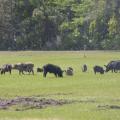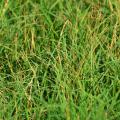News From 2014
RAYMOND -- A new book should provide private landowners with a comprehensive and easy-to-understand guide to current land management techniques for fisheries and wildlife.
Adam T. Rohnke, a certified wildlife biologist with the Mississippi State University Extension Service, served as managing editor for “Fish and Wildlife Management: A Handbook for Mississippi Landowners.”
By Karen Templeton
MSU College of Veterinary Medicine
MISSISSIPPI STATE -- When John and Paula Cormane took their dog to the Mississippi State University College of Veterinary Medicine, they could only hope he would be able to walk back out the same doors they carried him through.
MISSISSIPPI STATE -- Mississippi State University scientists are conducting research to determine the economic impact of wild hog damage to agriculture in Mississippi.
Bronson Strickland and Jessica Tegt, Extension wildlife biologists in the university’s Forest and Wildlife Research Center, are asking farmers and foresters to participate in the study.
If you are looking for an easy landscape plant that is guaranteed to please, the daylily is the plant for you.
Daylilies come in just about any color, shape or size you could want for your landscape. The colors are a kaleidoscope of red, peach, white and yellow. Aside from the stunning array of colors, the flowers themselves are not boring. Shapes include vibrant double flowers, petite flowers, flowers with gold-edged ruffles and spidery blooms with long, linear petals.
CARRIERE -- The 2014 Muscadine Field Day in Pearl River County on Aug. 23 will allow growers to learn from Mississippi State University researchers and examine the grape vines growing at the MSU McNeill Research Unit.
The event will run from 9 to 11 a.m. at the MSU research facility near Carriere. Participants will get to examine the fruit on the vines and hear speakers from MSU and the U.S. Department of Agriculture’s Agricultural Research Service.
Timely topics related to muscadine grapes include cultivars, best production practices, and insects and disease.
JACKSON -- Turf and forage producers in Mississippi need fewer clouds and more sunshine.
In 2014, forage producers raised an estimated 600,000 acres of hay across the state. There are about 60 farms producing sod for sale in the state.
Turf production…
The unusually harsh winter melted into a cool, wet spring and summer, which slowed spring growth and intensified diseases and last fall’s herbicide injury in sod, said Jay McCurdy, turf grass specialist with the Mississippi State University Extension Service.
Mississippi summers evoke thoughts of family vacations, rainy days and outdoor explorations. But with the heat and humidity come tiny critters that, if not discovered quickly, can ruin a fun day.
Nineteen species of ticks exist in Mississippi, but only a few are known to bite humans.
MISSISSIPPI STATE -- A young researcher from Maine and another from Brazil are finding Mississippi to be a good place to lay the foundation for scientific careers.
MISSISSIPPI STATE -- An experienced consumer economics professor has been named the new family financial management specialist for the Mississippi State University Extension Service.
MISSISSIPPI STATE -- Anyone interested in learning about the latest turfgrass management practices can attend the 2014 Mississippi State University Turfgrass and Ornamental Field Day to get access to industry experts.
The MSU Department of Plant and Soil Sciences will host the event in Starkville on Aug. 26.
In addition to five educational workshops led by the MSU Turfgrass Team, the field day will include a vendor expo with field demonstrations and opportunities for guests to have one-on-one discussions with experts at the MSU Extension Service booth.
MISSISSIPPI STATE -- Parents aren’t the only ones who struggle with time management anymore; school children are finding it more difficult to squeeze in all the things they want to do each day.
Larry Alexander, 4-H youth development specialist with the Mississippi State University Extension Service, said the beginning of the school year is a great time to make a time management plan.
Medical issues made it really tough on me this past year to do garden and landscape-related activities. At this point, I’m ready to start putting plants in the ground!
I know there are plenty of other gardeners in the same boat, and we all suffer from cabin fever that seems to set in earlier every year. So of course we are in the midst of the never-ending winter.
MISSISSIPPI STATE -- As early corn comes to market in July, growers are reminded that timing counts for a lot when it comes to planting corn. That’s why Mississippi State University scientists are researching the effects of planting date, plant population and hybrid selection on field corn yields.
PONTOTOC -- Sweet potato growers, crop consultants and other agricultural professionals can learn about current research and issues at a field day Aug. 20.
Researchers and specialists with Mississippi State University’s Extension Service and the Mississippi Agricultural and Forestry Experiment Station will host the event at the Pontotoc Ridge-Flatwoods Branch Experiment Station, located at 8320 Highway 15 South.
JACKSON -- Sneezing, itchy skin and swollen, watery eyes are hallmarks of spring and summer for some humans. But allergies can affect pets, too.
Dr. Juli Gunter, board-certified veterinary dermatology specialist and assistant professor in the Department of Clinical Sciences at the Mississippi State University College of Veterinary Medicine, said sensitivities to fleas and environmental elements, such as grass, tree and weed pollens and house dust mites, are the most common allergies in dogs and cats.
MISSISSIPPI STATE -- Mississippi State University has released the results of the winter wheat variety trials to help farmers plan for fall and winter wheat planting.
The university’s Official Variety Trials program evaluates the performance of agricultural crops planted throughout the state.
Researchers planted 82 varieties of wheat this past fall at eight locations in Mississippi. Fourteen companies provided seed for the trials.
Plants with tropical textures seem to attract the most interest in any landscape. Elephant ears just scream for attention wherever they grow. Most gardeners I know love elephant ears because they are easy-to-grow tropical plants that make a big impact.
Alocasia and Colocasia are the two species commonly found in our Mississippi landscapes. Today I want to concentrate on Colocasia, which is also called taro. It features big leaves and big texture, but it’s not all green.
MISSISSIPPI STATE -- Who knew Mississippi corn growers should worry about bears?
The bears are not in the fields eating the crop; they are in the market, eating the profits. When economists refer to a bear market, they are talking about declining stock prices over a prolonged period, usually a 20 percent or larger decline.
Brian Williams, agricultural economist with the Mississippi State University Extension Service, said several factors have pushed corn prices down in recent weeks.
MISSISSIPPI STATE -- As students head back to the classroom, parents should remain aware of their children’s online behavior -- whether for school assignments or socializing.
Jamie Varner, an instructor with the Mississippi State University Extension Service Center for Technology Outreach, said parents should warn their children about digital dangers and take practical steps to help keep them safe.
July is National Ice Cream Month…
MISSISSIPPI STATE -- As temperatures increase, so does the production of Mississippi State University’s ice cream, especially in July, which is National Ice Cream Month.
David Hall, MSU’s dairy process production manager, said ice cream sales have been steadily rising in recent years.
“In 2012, we sold 9,000 gallons of ice cream,” Hall said. “That year we sold 67,000 cups compared to 44,500 cups in 2005.”
Pages
News Types
- Crop Report (409)
- Feature Story (5806)
- Feature Photo (53)
- Extension Outdoors (318)
- Southern Gardening (1420)
- Extension Inbox (95)
Archive
- 2024 (69)
- 2023 (182)
- 2022 (187)
- 2021 (177)
- 2020 (212)
- 2019 (223)
- 2018 (276)
- 2017 (338)
- 2016 (383)
- 2015 (457)
- 2014 (498)
- 2013 (490)
- 2012 (492)
- 2011 (356)
- 2010 (323)
- 2009 (313)
- 2008 (273)
- 2007 (263)
- 2006 (252)
- 2005 (278)
- 2004 (273)
- 2003 (279)
- 2002 (228)
- 2001 (238)
- 2000 (243)
- 1999 (233)
- 1998 (232)
- 1997 (239)
- 1996 (58)
- 1995 (36)















